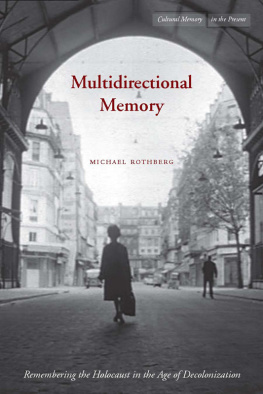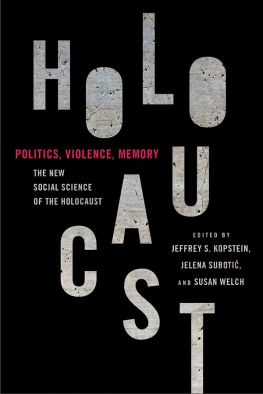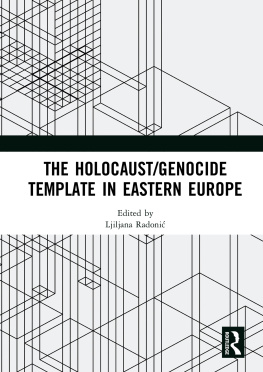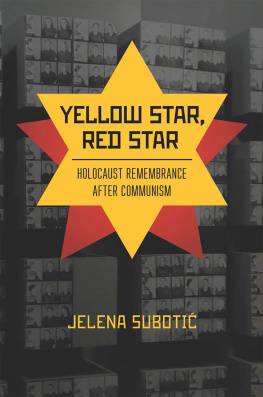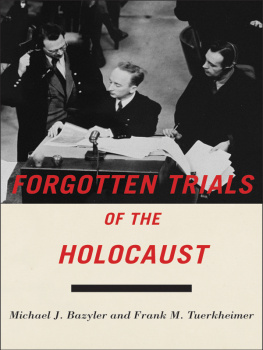Cultural Memory in the Present

Mieke Bal and Hent de Vries, Editors
MULTIDIRECTIONAL MEMORY
Remembering the Holocaust in the
Age of Decolonization
Michael Rothberg
STANFORD UNIVERSITY PRESS
STANFORD, CALIFORNIA
2009
Stanford University Press
Stanford, California
2009 by the Board of Trustees of the Leland Stanford Junior University. All rights reserved.
was originally published as Between Auschwitz and Algeria, Critical Inquiry 33, no. 1 (2006): 15884. Reprinted by permission of Critical Inquiry and the University of Chicago.
This book has been published with the assistance of the Program in Jewish Culture and Society at the University of Illinois at Urbana-Champaign.
No part of this book may be reproduced or transmitted in any form or by any means, electronic or mechanical, including photocopying and recording, or in any information-storage or -retrieval system without the prior written permission of Stanford University Press.
Printed in the United States of America on acid-free, archival-quality paper.
Library of Congress Cataloging-in-Publication Data
Rothberg, Michael.
Multidirectional memory : remembering the Holocaust in the age of decolonization / Michael Rothberg.
p. cm.(Cultural memory in the present)
Includes bibliographical references and index.
ISBN 978-0-8047-6217-5 (cloth : alk. paper)
ISBN 978-0-8047-6218-2 (pbk. : alk. paper)
1. Holocaust, Jewish (19391945)Historiography. 2. Holocaust, Jewish (19391945), in literature. 3. DecolonizationHistoriography. 4. Decolonization in literature. 5. Collective memory. 6. Collective memory in literature. I. Title. II. Series.
D804.348.R67 2009
940.5318072dc22
2008041759
E-book ISBN: 978-0-8047-8333-0
Yasemineaujourdhui et demain
Illustrations
Acknowledgments
Multidirectional Memory brings together Holocaust studies and postcolonial studies for the first time in a book-length work. It seeks to reconstruct the relations between at least three primary archives that span transnational cultural spaces. It combines consideration of black Atlantic and French-Algerian contact zones, and it reads both of these formations across and through diasporic Jewish history. Drawing on the resources of these unusual conjunctions, this book seeks to change thinking about collective memory and its relation to group identity. It does so in two ways: by interrogating the logic of dominant accounts of memory and identitya logic I see defined by competition and the zero-sum gameand by uncovering a countertradition in which remembrance of the Holocaust intersects with the legacies of colonialism and slavery and ongoing processes of decolonization. The countertradition I uncover continues to this day, but it has its roots in generations of activists and intellectuals who are now passing from the scene and whose example inspired this book. Some of these figures are well known in the contemporary academy; some should be better known. They include several who died during the writing of Multidirectional MemoryAim Csaire, Andr Mandouze, Jean Rouch, Andr Schwarz-Bart, and Pierre Vidal-Naquetas well as several who passed away in earlier decades, including Hannah Arendt, Charlotte Delbo, Marguerite Duras, and W. E. B. Du Bois. I am convinced much remains to be learned from them, as from those figures who are still very much active, such as Didier Daeninckx, Michael Haneke, Caryl Phillips, and Lela Sebbar.
Working at the intersection of two fields and several national contexts means that Ive incurred many personal and intellectual debts during the last years of work on this project. Im grateful to the editors, anonymous readers, and editorial collectives of three journals for helping make is to appear in a volume edited by R. Clifton Spargo and Robert M. Ehrenreich and to be published by Rutgers University Press and the United States Holocaust Memorial Museum. At Stanford University Press, I was fortunate to find Emily-Jane Cohen, whose enthusiasm for the project has been gratifying. Thanks also to Ariane De Pree-Kajfez at Stanford for helping me navigate the treacherous waters of permissions and rights, and to Sarah Crane Newman, Tim Roberts, and Alex Giardino for their help in getting the manuscript into shape and into the world. Andreas Huyssen, whose work on memory has inspired me from the beginning, provided a supportive and helpful readers report, as did another, very generous anonymous reviewer for the press. I couldnt imagine a better home for the book than Mieke Bal and Hent de Vriess series Cultural Memory in the Present.
A number of colleagues invited me to present portions of this work in a series of stimulating venues. Eleanor Kaufman organized what turned out to be a particularly lively exchange at the University of Virginia early in the project. A seminar and conference at the U.S. Holocaust Memorial Museum provided another early venue for this work, as did conferences organized by David Bathrick at Cornell and Marianne Hirsch at Dartmouth. Participating in Dirk Mosess important Genocide and Colonialism conference at the University of Sydney was an especially significant experience. In the summer of 2004 I worked on this project as a fellow of the Simon-Dubnow Institute for Jewish History and Culture, and I am grateful to its director, Dan Diner, for a warm welcome in Leipzig. I got to try out versions of the thesis of this book in a couple of invigorating dialogues with the delightfully skeptical Walter Benn Michaels, once during a seminar organized by graduate students at the University of Illinois at Chicago and once during a conference organized by my colleague Gordon Hutner. As I was nearing completion of the project, I had the good fortune of participating in a seminar in Berlin on Holocaust literature and narrative theory hosted by Jakob Lothe, James Phelan, and Susan Suleiman and in the 2007 conference of the Post-45 collective hosted by J. D. Connor and Amy Hungerford at Harvard. Erica Lehrers invitation to give the Annual Public History Lecture at Concordia University in Montreal (an invitation from one nonhistorian to another!) provided an occasion that proved to be both fun and invigorating.
Beyond my home base in Champaign-Urbana, many colleagues and friends have contributed in innumerable ways to this project. New York will always be home away from home; thanks to Beth Drenning and Neil Levi, Jeffrey Escoffier, Matthew Lore, Carine Montbertrand, Helen Roth, and Jennie Uleman for hospitality, friendship, and toleration of our outrageous epicurean demands. Beth and Neil have also helped this project evolve from its earliest moments to its latest. Nancy K. Miller has been an inspiration and supporter since I entered the profession. Gary Weissman is always a challenging interlocutor, not to mention an expert CD-burner. Russ Castronovo is a fine reader and even finer friend. The Summer Institute crowd continues to be an audience I value: Liz Blasco, Susan Hegeman, Caren Irr, Carolyn Lesjak, Chris Pavsek, Rob Seguin, and Phil Wegner. Recently Ive had the good fortune to meet a number of people pursuing exciting related projects, including Stef Craps, Debarati Sanyal, Max Silverman, and Estelle Tarica. Philippe Mesnard and Carola Hhnel-Mesnard have been generous and engaging friends in Paris, as have been Andrs Nader and Agns Benoit-Nader in Berlin. A number of other colleagues from far and wide influenced this work in various waysby responding to parts of the book, by providing references, or simply through the example of their own scholarship: Leslie Adelson, Lauren Berlant, Bryan Cheyette, Sam DiIorio, Sidra Ezrahi, Marianne Hirsch, Irene Kacandes, Jean-Louis Jeannelle, Dominick LaCapra, Darrell Moore, Dirk Moses, Sam Moyn, Debbie Nelson, Bruce Robbins, Ronnie Scharfman, Cliff Spargo, Dan Stone, Susan Suleiman, and Jrgen Zimmerer. Although he certainly doesnt know it, Manthia Diawara had a profound influence on the shape of this book when he presented his film
Next page
